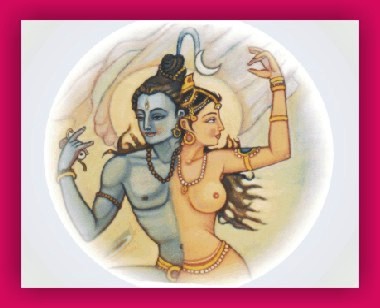SOUL - NATURE OR PURUSHA
- PRAKRITI
...the Purusha is an inactive conscious existence, — it is the Soul the same
in itself and immutable forever, - Prakriti the  active force of Nature which by its motion creates and maintains and by its sinking into rest dissolves
the phenomenon of the cosmos. Leaving aside these philosophical distinctions, we come to the original psychological
experience from which all really take their start, that there are two lements in the existence of living beings,
of human beings at least if not of all cosmos, — a dual being, Nature and the soul. (or Purusha and Prakriti).
active force of Nature which by its motion creates and maintains and by its sinking into rest dissolves
the phenomenon of the cosmos. Leaving aside these philosophical distinctions, we come to the original psychological
experience from which all really take their start, that there are two lements in the existence of living beings,
of human beings at least if not of all cosmos, — a dual being, Nature and the soul. (or Purusha and Prakriti).
...the Purusha or Conscious-Soul is a passive, inactive, immutable entity, Prakriti
or the Nature-Soul including even the mind and the understanding active, mutable, mechanical, but reflected in
the Purusha which identifies with what is reflected in it and lends to it its own light of consciousness. When
the Purusha learns not to identify himself, then Prakriti begins to fall away from its impulse of movement and
returns towards equilibrium and rest.
The distinction made in the Gita between the Purusha and the Prakriti gives us
the clue to the various attitudes which the soul can adopt towards Nature in its movement towards perfect freedom
and rule. The Purusha is, says the Gita, witness, upholder, source of the sanction, knower, lord, enjoyer; Prakriti
executes, it is the active principle and must have an operation corresponding to the attitude of the Purusha. The
soul may assume, if it wishes, the poise of the pure witness, saksi; it may look on at the action of Nature
as a thing from which it stands apart; it watches, but does not itself participate. We have seen the importance
of this quietistic capacity; it is the basis of the movement of withdrawal by which we can say of everything, —
body, life, mental action, thought, sensation, emotion, — "This is Prakriti working in the life, mind and
body, it is not myself, it is not even mine," or "This is imposed on me, but really external to myself,"
and come to the soul's separation from these things and their quiescence.
This status of an inner passivity and an outer action independent of each other
is a state of entire spiritual freedom. The Yogin, as the Gita says, even in acting does no actions, for it is
not he, but universal Nature directed by the Lord of Nature which is at work. He is not bound by his works, nor
do they leave any after effects or consequences in his mind, nor cling to or leave any mark on his soul; they vanish
and are dissolved by their very execution and leave the immutable self unaffected and the soul unmodified. Therefore
this would seem to be the poise the uplifted soul ought to take, if it has still to preserve any relations with
human action in the world-existence, an unalterable silence, tranquillity, passivity within, an action without
regulated by the universal Will and Wisdom which works, as the Gita says, without being involved in, bound by or
ignorantly attached to its works. And certainly this poise of a perfect activity founded upon a perfect inner passivity
is that which the Yogin has to possess...
This is the knot that ties together the stars:
The Two who are one are the secret of all power,
The Two who are one are the might and right in things.
His soul, silent, supports the world and her,
His acts are are her commandment's registers.

 active force of Nature which by its motion creates and maintains and by its sinking into rest dissolves
the phenomenon of the cosmos. Leaving aside these philosophical distinctions, we come to the original psychological
experience from which all really take their start, that there are two lements in the existence of living beings,
of human beings at least if not of all cosmos, — a dual being, Nature and the soul. (or Purusha and Prakriti).
active force of Nature which by its motion creates and maintains and by its sinking into rest dissolves
the phenomenon of the cosmos. Leaving aside these philosophical distinctions, we come to the original psychological
experience from which all really take their start, that there are two lements in the existence of living beings,
of human beings at least if not of all cosmos, — a dual being, Nature and the soul. (or Purusha and Prakriti).